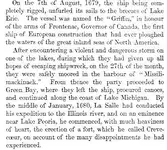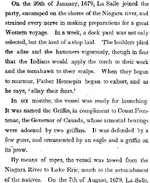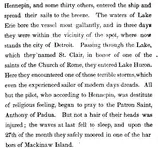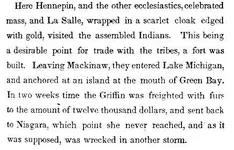Here is a detailed account of the first (and last) voyage of Le Griffon. I must give a hat tip to Guy in the Back - you beat me to it. I hope you don't mind me posting a more extensive account.
France and England in North America; A Series of Historical Narratives, Part Third; The Discovery of the Great West, by Francis Parkman (Boston: 1870)
A more important work than that of the warehouse at the mouth of the river was now to be begun. This was the building of a vessel above the cataract. ..{at} the mouth of a stream which entered the Niagara two leagues above the cataract, and which was undoubtedly that now called Cayuga Creek…[The neighboring village now bears the name of La Salle.] Trees were felled, the place cleared, and the master-carpenter set his ship-builders at work. Meanwhile two Mohegan hunters, attached to the party, made bark wigwams to lodge the men.
Hennepin had his chapel, apparently of the same material, where he placed his altar, and on Sundays and saints' days said mass, preached, and exhorted; while some of the men, who knew the Gregorian chant, lent their aid at the service. When the carpenters were ready to lay the keel of the vessel, La Salle asked the friar to drive the first bolt; "but the modesty of my religious profession," he says, "compelled me to decline this honor."
…On a paper drawn up at the instance of the Intendant Duchesneau, the names of the greater number of La Salle's men are preserved. These agree with those given by Hennepin: thus the master-carpenter, whom he calls Maitre Moyse, appears as Moise Hillaret, and the blacksmith, whom he calls La Forge, is mentioned as--(illegible) dit la Forge.] The work of the ship-builders advanced rapidly; and when the Indian visitors beheld the vast ribs of the wooden monster, their jealousy was redoubled. A squaw told the French that they meant to burn the vessel on the stocks. All now stood anxiously on the watch. Cold, hunger, and discontent found imperfect antidotes in Tonty's energy and Hennepin's sermons.
During his {La Salle’s} absence Tonty finished the vessel, which was of about forty- five tons burden. [Hennepin (1683), 46. In the edition of 1697, he says that it was of sixty tons. I prefer to follow the earlier and more trustworthy narrative.] As spring opened, she was ready for launching. The friar pronounced his blessing on her; the assembled company sang Te Deum; cannon were fired; and French and Indians, warmed alike by a generous gift of brandy, shouted and yelped in chorus as she glided into the Niagara. Her builders towed her out and anchored her in the stream, safe at last from incendiary hands, and then, swinging their hammocks under her deck, slept in peace, beyond reach of the tomahawk. The Indians gazed on her with amazement. Five small cannon looked out from her portholes; and on her prow was carved a portentous monster, the Griffin, whose name she bore, in honor of the armorial bearings of Frontenac. La Salle had often been heard to say that he would make the griffin fly above the crows, or, in other words, make Frontenac triumph over the Jesuits.
They now took her up the river, and made her fast below the swift current at Black Rock. Here they finished her equipment, and waited for La Salle's return; but the absent commander did not appear. The spring and more than half of the summer had passed before they saw him again. ..It required four of them {La Salle’s men}, well stimulated with brandy, to carry up the principal anchor destined for the "Griffin."
…
The "Griffin" had lain moored by the shore, so near that Hennepin could preach on Sundays from the deck to the men encamped along the bank. She was now forced up against the current with tow-ropes and sails, till she reached the calm entrance of Lake Erie. On the seventh of August {1679}, the voyagers, thirty-four in all, embarked, sang Te Deum, and fired their cannon. A fresh breeze sprang up; and with swelling canvas the "Griffin" ploughed the virgin waves of Lake Erie, where sail was never seen before. For three days they held their course over these unknown waters, and on the fourth turned northward into the strait of Detroit. Here, on the right hand and on the left, lay verdant prairies, dotted with groves and bordered with lofty forests.
They saw walnut, chestnut, and wild plum trees, and oaks festooned with grape-vines; herds of deer, and flocks of swans and wild turkeys. The bulwarks of the "Griffin" were plentifully hung with game which the men killed on shore, and among the rest with a number of bears, much commended by Hennepin for their want of ferocity and the excellence of their flesh. "Those," he says, "who will one day have the happiness to possess this fertile and pleasant strait, will be very much obliged to those who have shown them the way." They crossed Lake St. Clair, [They named it Sainte Claire, of which the present name is a perversion.] and still sailed northward against the current, till now, sparkling in the sun, Lake Huron spread before them like a sea.
For a time, they bore on prosperously. Then the wind died to a calm, then freshened to a gale, then rose to a furious tempest; and the vessel tossed wildly among the short, steep, perilous waves of the raging lake. Even La Salle called on his followers to commend themselves to Heaven. All fell to their prayers but the godless pilot, who was loud in complaint against his commander for having brought him, after the honor he had won on the ocean, to drown at last ignominiously in fresh water. The rest clamored to the saints. St. Anthony of Padua was promised a chapel to be built in his honor, if he would but save them from their jeopardy; while in the same breath La Salle and the friars declared him patron of their great enterprise. [Hennepin (1683), 58.]
The saint heard their prayers. The obedient winds were tamed; and the "Griffin" plunged on her way through foaming surges that still grew calmer as she advanced. Now the sun shone forth on woody islands, Bois Blanc and Mackinaw and the distant Manitoulins,--on the forest wastes of Michigan and the vast blue bosom of the angry lake; and now her port was won, and she found her rest behind the point of St. Ignace of Michillimackinac, floating in that tranquil cove where crystal waters cover but cannot hide the pebbly depths beneath. Before her rose the house and chapel of the Jesuits, enclosed with palisades; on the right, the Huron village, with its bark cabins and its fence of tall pickets; on the left, the square compact houses of the French traders; and, not far off, the clustered wigwams of an Ottawa village. [There is a rude plan of the establishment in La Hontan, though, in several editions, its value is destroyed by the reversal of the plate.]
Here was a centre of the Jesuit missions, and a centre of the Indian trade; and here, under the shadow of the cross, was much sharp practice in the service of Mammon. Keen traders, with or without a license; and lawless coureurs de bois, whom a few years of forest life had weaned from civilization, made St. Ignace their resort; and here there were many of them when the "Griffin" came. They and their employers hated and feared La Salle, who, sustained as he was by the Governor, might set at nought the prohibition of the king, debarring him from traffic with these tribes. Yet, while plotting against him, they took pains to allay his distrust by a show of welcome.
The "Griffin" fired her cannon, and the Indians yelped in wonder and amazement. The adventurers landed in state, and marched, under arms, to the bark chapel of the Ottawa village, where they heard mass. La Salle knelt before the altar, in a mantle of scarlet, bordered with gold. Soldiers, sailors, and artisans knelt around him,--black Jesuits, gray Recollets, swarthy voyageurs and painted savages; a devout but motley concourse.
As they left the chapel, the Ottawa chiefs came to bid them welcome, and the Hurons saluted them with a volley of musketry. They saw the "Griffin" at her anchorage, surrounded by more than a hundred bark canoes, like a Triton among minnows. Yet it was with more wonder than good-will that the Indians of the mission gazed on the floating fort, for so they called the vessel. A deep jealousy of La Salle's designs had been, infused into them. His own followers, too, had been tampered with. In the autumn before, it may be remembered, he had sent fifteen men up the lakes, to trade for him, with orders to go thence to the Illinois, and make preparation against his coming. Early in the summer, Tonty had been despatched in a canoe, from Niagara, to look after them. [Tonty, Memoire, MS. He was overtaken at the Detroit by the "Griffin."]
It was high time. Most of the men had been seduced from their duty, and had disobeyed their orders, squandered the goods intrusted to them, or used them in trading on their own account. La Salle found four of them at Michillimackinac. These he arrested, and sent Tonty to the Falls of Ste. Marie, where two others were captured, with their plunder. The rest were in the woods, and it was useless to pursue them.
Early in September, long before Tonty had returned from Ste. Marie, La Salle set sail again, and, passing westward into Lake Michigan, [Then usually known as Lac des Illinois, because it gave access to the country of the tribes so called. Three years before, Allouez gave it the name of Lac St. Joseph, by which it is often designated by the early writers. Membre, Douay, and others, call it Lac Dauphin.] cast anchor near one of the islands at the entrance of Green Bay. Here, for once, he found a friend in the person of a Pottawattamie chief, who had been so wrought upon by the politic kindness of Frontenac, that he declared himself ready to die for the children of Onontio. ["The Great Mountain," the Iroquois name for the Governor of Canada. It was borrowed by other tribes also.]
Here, too, he found several of his advanced party, who had remained faithful, and collected a large store of furs. It would have been better had they proved false, like the rest. La Salle, who asked counsel of no man, resolved, in spite of his followers, to send back the "Griffin," laden with these furs, and others collected on the way, to satisfy his creditors. [In the license of discovery, granted to La Salle, he is expressly prohibited from trading with the Ottawas and others who brought furs to Montreal. This traffic on the lakes was, therefore, illicit. His enemy, the Intendant Duchesneau, afterwards used this against him.--Lettre de Duchesneau an Ministre, 10 Nov. 1680, MS] She fired a parting shot, and, on the eighteenth of September, spread her sails for Niagara, in charge of the pilot, who had orders to return with her to the Illinois as soon as he had discharged his cargo. La Salle, with the fourteen men who remained, in four canoes, deeply laden with a forge, tools, merchandise, and arms, put out from the island and resumed his voyage.
The parting was not auspicious. The lake, glassy and calm in the afternoon, was convulsed at night with a sudden storm, when the canoes were midway between the island and the main shore. It was with much ado that they could keep together, the men shouting to each other through the darkness. Hennepin, who was in the smallest canoe, with a heavy load, and a carpenter for a companion, who was awkward at the paddle, found himself in jeopardy which demanded all his nerve. The voyagers thought themselves happy when they gained at last the shelter of a little sandy cove, where they dragged up their canoes, and made their cheerless bivouac in the drenched and dripping forest. Here they spent five days, living on pumpkins and Indian corn, the gift of their Pottawattamie friends, and on a Canada porcupine, brought in by La Salle's Mohegan hunter. The gale raged meanwhile with a relentless fury. They trembled when they thought of the "Griffin." When at length the tempest lulled, they re-embarked, and steered southward, along the shore of Wisconsin; but again the storm fell upon them, and drove them, for safety, to a bare, rocky islet. Here they made a fire of driftwood, crouched around it, drew their blankets over their heads, and in this miserable plight, pelted with sleet and rain, remained for two days.…The lake, swept by an easterly gale, was rolling its waves against the beach, like the ocean in a storm…
…where was the "Griffin"? Time enough, and more than enough, had passed for her voyage to Niagara and back again. He {La Salle} scanned the dreary horizon with an anxious eye. No returning sail gladdened the watery solitude, and a dark foreboding gathered on his heart. Yet farther delay was impossible. He sent back two men to Michillimackinac to meet her, if she still existed, and pilot her to his new fort of the Miamis, and then prepared to ascend the river, whose weedy edges were already glassed with thin flakes of ice.
= The End =
Comments within brackets "[ ]" are from the original (Mr. Parkman's notes). Comments with "{ }" are this editor's.
Good luck to all,
~The Old Bookaroo







